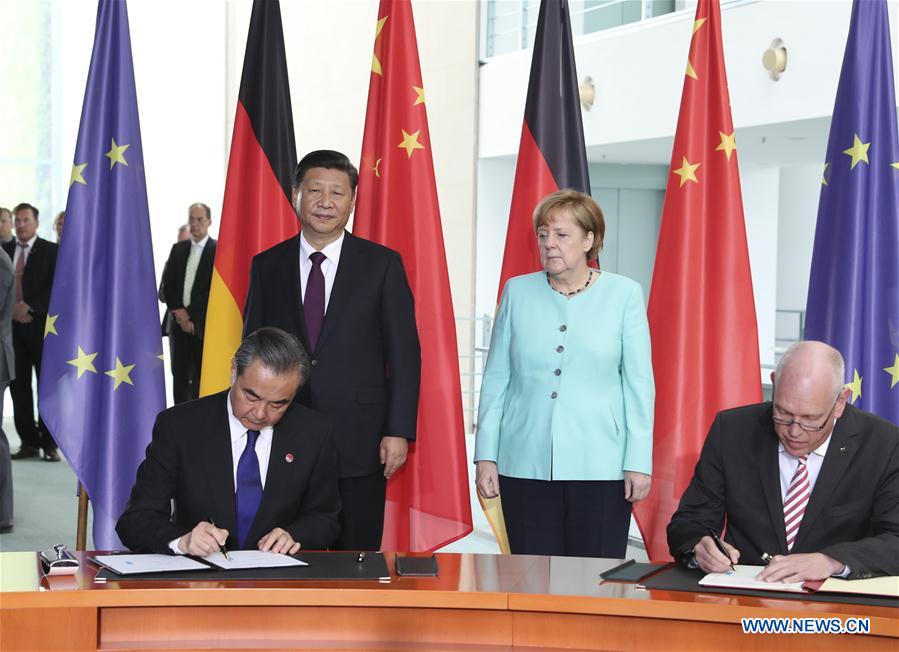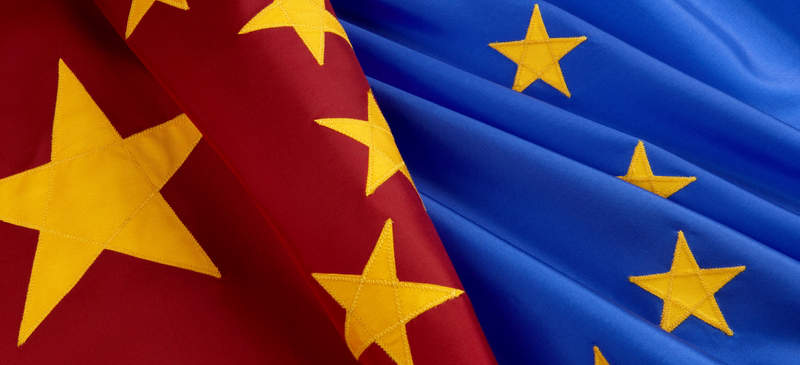


Chinese President Xi Jinping and German Chancellor Angela Merkel attend a signing ceremony after their talks in Berlin, capital of Germany, July 5, 2017. (Xinhua/Ma Zhancheng)
China’s investment in the western Balkans has once again stirred controversy among European leaders, with German Chancellor Angela Merkel on Wednesday warning that China must not link its investment to political demands, a remark that was criticized by experts as “Cold War mentality.”
During a joint press conference in Berlin with Macedonian Prime Minister Zoran Zaev, Merkel noted that free trade must be reciprocal and not just from one side but from all sides. The Chancellor later claimed that she has no objections to the fact that China wants to trade and invest.
“The question is…are the economic relations being linked with political questions?” she was quoted as saying by AFP.
“Merkel’s remarks are in line with a recently rising tide of “China threat” rhetoric in Europe. Such remarks show European countries’ distrust in a rising China, a Cold War mentality caused by their misinterpretation of China’s development and political system,” Sun Chenghao, an assistant research fellow of China Institute of Contemporary International Relation, told People’s Daily Online.
“As a major supporter and impeller of the European Integration, Germany has been querying China’s Belt and Road Initiative and 16+1 cooperation, fearing that such projects may undermine the integration and development of Europe, which, of course is not correct,” added Sun.
Merkel is not the first European leader that slashed China for its investment in Europe. During the three-day Munich Security Conference wrapped up on Feb. 18, German Foreign Minister Sigmar Gabriel accused China of “constantly trying to test and undermine the unity of the European Union,” while French President Emmanuel Marcon on a recent China visit warned that some European countries are much more open to Chinese interests, sometimes “at the expense of a European interest,” according to AFP.

[File photo]
“Following China’s increasing global influence, “China threat” rhetoric has once again gained popularity in western countries, as the latter can either accept China’s rise as a totally different political and ideological entity or admit the fact that they are losing edge in their traditional sphere of influence,” Sun noted.
Despite Germany’s accusation, Chinese authorities have been reiterating its stance on supporting the European integration. Hua Chunying, spokesperson of China’s Ministry of Foreign Affairs, noted in August 2017 that German should stop making irresponsible remarks that will not help enhance mutual trust and cooperation.
“When the EU faces many internal problems, I believe that China's firm support to the European integration is ever more precious and valuable and should be cherished by the European side,” said Hua.
As EU’s biggest source of imports and second-biggest export market, China trades with EU on average over 1 billion euros a day, making it an irreplaceable partner for the steadily economic growth of Europe, according to European Commission.
 Fire brigade in Shanghai holds group wedding
Fire brigade in Shanghai holds group wedding Tourists enjoy ice sculptures in Datan Town, north China
Tourists enjoy ice sculptures in Datan Town, north China Sunset scenery of Dayan Pagoda in Xi'an
Sunset scenery of Dayan Pagoda in Xi'an Tourists have fun at scenic spot in Nanlong Town, NW China
Tourists have fun at scenic spot in Nanlong Town, NW China Harbin attracts tourists by making best use of ice in winter
Harbin attracts tourists by making best use of ice in winter In pics: FIS Alpine Ski Women's World Cup Slalom
In pics: FIS Alpine Ski Women's World Cup Slalom Black-necked cranes rest at reservoir in Lhunzhub County, Lhasa
Black-necked cranes rest at reservoir in Lhunzhub County, Lhasa China's FAST telescope will be available to foreign scientists in April
China's FAST telescope will be available to foreign scientists in April "She power" plays indispensable role in poverty alleviation
"She power" plays indispensable role in poverty alleviation Top 10 world news events of People's Daily in 2020
Top 10 world news events of People's Daily in 2020 Top 10 China news events of People's Daily in 2020
Top 10 China news events of People's Daily in 2020 Top 10 media buzzwords of 2020
Top 10 media buzzwords of 2020 Year-ender:10 major tourism stories of 2020
Year-ender:10 major tourism stories of 2020 No interference in Venezuelan issues
No interference in Venezuelan issues
 Biz prepares for trade spat
Biz prepares for trade spat
 Broadcasting Continent
Broadcasting Continent Australia wins Chinese CEOs as US loses
Australia wins Chinese CEOs as US loses